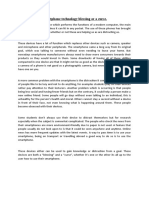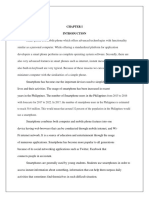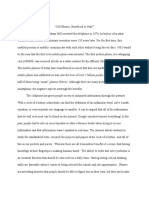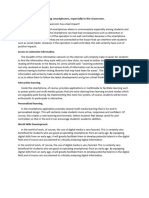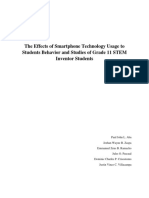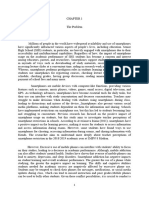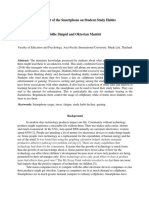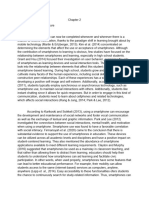Smartphone : A Hero or Foe?
Elia Oktaviana, Guswari Dirga Santara
Applied Nursing Anesthesiology Study Program, Faculty of Health Sciences
Universitas ‘Aisyiyah Yogyakarta
In this fast-paced digital era, smartphones have become an inseparable part of our lives.
Smartphones (gadgets) are small electronic devices that function as modern and practical
communication tools and easy internet access today (Putri, 2016). However, behind the ease and
comfort offered, a fundamental question arises: is the smartphone a hero that makes our lives easier,
or is it an enemy that threatens our well-being?
Currently, smartphones are widely used by people of all ages, from children, teenagers, to
adults. These smartphones are equipped with advanced features that are useful for supporting the
needs of everyday life. The growing use of smartphones (gadgets) has various positive and negative
impacts. One of the positive impacts is that if used for learning purposes, it will help improve
academic grades (Oktario, 2017). Using this device, you can search and get the latest information
quickly anytime and anywhere. News applications, web browsers, and social media allow users to
stay connected with global and local developments. Information that was previously difficult to
reach is now in the palm of your hand, facilitating the learning process and making decisions.
Smartphones have revolutionized the way we communicate by providing a variety of features that
allow for more efficient communication. You can send instant messages, make video calls, or
participate in virtual conferences with ease. The ability to connect in real-time with people around
the world makes smartphones an essential tool for keeping personal and professional relationships
strong.But on the other hand, in its daily use, smartphones have the potential to cause dependence
and addiction. Uncontrolled smartphone use can have negative impacts on health, both physically
and mentally. One common health problem is tired eyes due to staring at the gadget screen for too
long.In addition, along with the increasing use of smartphones, threats to privacy, hacking and user
security are also serious concerns. Data collection by the applications used can access personal
information without your knowledge, This data can be used by third parties for commercial
purposes or misused. Therefore, it is very important to be more selective in granting application
permissions and read privacy policies carefully.
Although the use of smartphones has some negative impacts, the benefits offered are far
greater. as the writers, we think that Smartphones have become a very useful tool in our daily lives,
helping us to incrase our productivity, psychological condition and social living. Therefore,
smartphones deserve to be called "heroes" in this digital era.
� The first reason is based on the jurnal study conducted by Nugraha, A. I. (2018) showed
that the use of smartphones in improving student learning activities was quite large (24.6%). The
availability of many applications on smartphones supports increased productivity, with applications
such as “To-doist” for task management and “Google Classroom” for collaboration. Smartphones
allow students to complete assignments on the go, a big appreciation to internet access that
facilitates real-time information retrieval and collaboration, especially in distance or hybrid
learning.Smartphone use also increases students’ time efficiency. Features such as reminders,
calendars, and digital notes help them plan their studies and meet deadlines. Applications such as
“Google Drive” make it easy to store and share documents, saving time that would normally be
spent physically submitting assignments.
The second reason based on the journal conducted by Ramadhan, V. A. (2023) showed that
smartphones have a positive effect in improving children's cognitive and affective abilities.
Smartphones provide access to a variety of educational apps and resources that can help children
learn. Apps like “Quizlet” or “Anki” allow children to practice in remembering information through
effective repetition. Studies have shown that using these apps can improve children’s memory, as
they are engaged in the active process of learning and remembering information. By easy access to
information and a variety of learning resources, smartphones help children improve their reasoning
skills. Children can conduct research quickly and gain different perspectives on a topic. Access to
a variety of information sources through smartphones encourages children to think critically. They
learn to evaluate the information they receive, distinguish between fact and opinion, and consider
multiple viewpoints before making decisions.
The third reason based on the journal conducted by Basit, A (2022) showed that
communication via mobile phones improves relationships with others, with the ability to share
experiences, photos, and important moments directly, individuals can feel more connected with
friends and family. Social media is a digital platform that allows users to share information, interact,
and build communities through applications such as “Facebook”, “Instagram”, and “TikTok”,
providing an opportunity to find people with similar interests. By using smartphones, as the
communication has becomes easier and faster through instant messaging applications and video
calls, allowing real-time interactions without distance limitations. They help users build a wider
network of friends with people from various backgrounds, enriching social experiences and
interpersonal skills.
Here, in another hint, a research by Rizaldi, D. R. (2024) indicates that the use of
smartphone while studying often involves multitasking, which can decrease academic
performance; this study also found that students who used social media or sent messages while
studying had lower GPAs than those who did not. Multitasking can reduce attention capacity and
make it difficult for students to focus on the subject matter.
� Another reason based on the journal conducted by Yajid, F. (2023) showed that children
who are exposed to negative content on social media can also worsen their mental health, causing
feelings of anxiety or depression due to online bullying. Smartphones can also hinder children's
cognitive development; when children spend more time in front of screens, they tend to be less
involved in activities that stimulate brain development, such as playing outside or interacting with
peers, which can reduce their critical thinking skills and creativity, as well as affect their overall
learning ability.
These factors may be true if we refer to survey data from various existing studies. However,
with the right approach to smartphone use, many of these concerns can be minimized or overcome.
Through parental supervision, good management and limits on use, children can learn to use these
devices in a balanced way.
Smartphones have once again become an essential tool that affects many aspects of our
lives. Smartphones offer easy access to information to more efficient communication, so that
smartphones provide various benefits that support productivity and entertainment. As technology
advances, smartphones will continue to develop further, so that they will integrate more features
that facilitate learning and communication. Therefore, it is very important for us to use smartphones
with full awareness and responsibility. As we explore this digital landscape together, remember:
"Technology is a tool where how we use it determines its impact." Let us commit to using our
smartphones wisely so that smartphones remain our allies in this fast-paced world.



